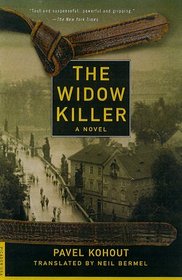Good story, different type of detective story, really enjoyed this one.
in the downward spiral of the third reich's final days, a sadistic
serial killer is stalking the streets of Prague..a gestapo agent and a rookie czech policeman set out to stop the murderer
serial killer is stalking the streets of Prague..a gestapo agent and a rookie czech policeman set out to stop the murderer
From brutal clarity to bloody chaos, June 8, 2013
By Dr. Frank Stech
Novelist Pavel Kohout has written "The Widow Killer: A Novel," a detective story set in Nazi-occupied Prague; "I Am Snowing," about the effects on the informers and their victims of opening of the Communist-era secret police files; and "The Hangwoman," about executioners. As we might expect from this list, there isn't even a smidgeon of humor in "The Widow Killer." Which is too bad, since the Czechs have notably droll and sophisticated funny bones, homicide cops tend to grow humor defenses along with thick hides towards man's inhumanity to man (Philip Kerr's Bernie Gunther is a classic case), and sometimes observers of Nazi occupiers (for example, Hans Helmut Kirst's Lt. Colonel Grau and Inspector Prever in his classic "The Night of the Generals") draw wickedly funny caricatures of these jack-booted thugs. Kohout's "The Widow Killer" has none of this and is as grim as it gets. Perhaps Prague escaped much of the physical destruction of other occupied capitals; Kohout uses his novel to show how, under the Baroque architecture, Prague's soul was burned and brutalized.
A deranged sociopath begins coolly carving Prague's widows, welding his poultry knife in the waning days of the Nazi "Protectorate" (translate, brutal German occupation). His insanity has a crystal-clear religious basis, exposed in the confessional, but hidden by a cowardly misguided priest. As the killer perfects his craft, the police realize they face an extremely devious and efficient serial butcher.
A young Czech inspector, Morava, is partnered with a senior Gestapo police officer, Buback, and each has his secret personal agenda, while their superiors, anticipating the chaos as the Russians and Americans converge on German-held Prague, have even deeper secret agendas for the pair and their organizations. As the Widow Killer gets better and better at his slaughter, the Prague police and their Gestapo "minder" find the Fates dead set against them.
Just as the Czech detective sets a trap for the Widow Killer, the Fates set the warring forces into collision, and from the most personal level to the fate and future of the Czech nation, Prague collapses into chaos. Almost everything literally comes down in flames. Only the young Czech detective is still standing; indeed, he rises to the top of the new Communist Czech police forces. But as Kohout tells us in the last line of "The Widow Killer: A Novel": "He had no idea he was rushing headlong into his worst mistake."
This book is no mystery entertainment. It is a parable.
By Dr. Frank Stech
Novelist Pavel Kohout has written "The Widow Killer: A Novel," a detective story set in Nazi-occupied Prague; "I Am Snowing," about the effects on the informers and their victims of opening of the Communist-era secret police files; and "The Hangwoman," about executioners. As we might expect from this list, there isn't even a smidgeon of humor in "The Widow Killer." Which is too bad, since the Czechs have notably droll and sophisticated funny bones, homicide cops tend to grow humor defenses along with thick hides towards man's inhumanity to man (Philip Kerr's Bernie Gunther is a classic case), and sometimes observers of Nazi occupiers (for example, Hans Helmut Kirst's Lt. Colonel Grau and Inspector Prever in his classic "The Night of the Generals") draw wickedly funny caricatures of these jack-booted thugs. Kohout's "The Widow Killer" has none of this and is as grim as it gets. Perhaps Prague escaped much of the physical destruction of other occupied capitals; Kohout uses his novel to show how, under the Baroque architecture, Prague's soul was burned and brutalized.
A deranged sociopath begins coolly carving Prague's widows, welding his poultry knife in the waning days of the Nazi "Protectorate" (translate, brutal German occupation). His insanity has a crystal-clear religious basis, exposed in the confessional, but hidden by a cowardly misguided priest. As the killer perfects his craft, the police realize they face an extremely devious and efficient serial butcher.
A young Czech inspector, Morava, is partnered with a senior Gestapo police officer, Buback, and each has his secret personal agenda, while their superiors, anticipating the chaos as the Russians and Americans converge on German-held Prague, have even deeper secret agendas for the pair and their organizations. As the Widow Killer gets better and better at his slaughter, the Prague police and their Gestapo "minder" find the Fates dead set against them.
Just as the Czech detective sets a trap for the Widow Killer, the Fates set the warring forces into collision, and from the most personal level to the fate and future of the Czech nation, Prague collapses into chaos. Almost everything literally comes down in flames. Only the young Czech detective is still standing; indeed, he rises to the top of the new Communist Czech police forces. But as Kohout tells us in the last line of "The Widow Killer: A Novel": "He had no idea he was rushing headlong into his worst mistake."
This book is no mystery entertainment. It is a parable.




